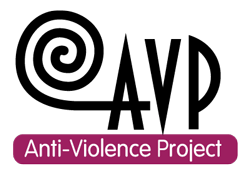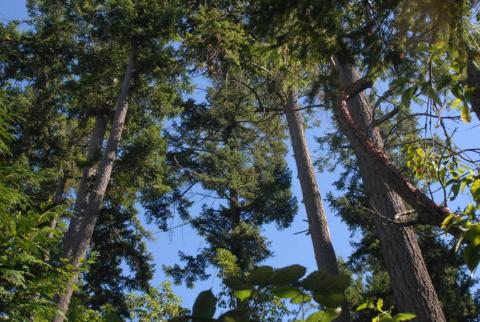What is Transformative Justice and Community Accountability?
Hey, my name is Alyssa (she/they). I spent the last couple of months working with AVP as the work study student. I had the opportunity to research transformative justice and community accountability, resulting in a mini-zine and a syllabus called “TJ/CA 101.” The syllabus is for people who would like to learn about what TJ/CA is, how it works, and the values it is rooted in. It also includes resources for people who are interested in facilitating a TJ/CA process. Further, there are resources for people who have done harm and are committed to doing better. I encourage you to look into it and find ways to practice compassion and accountability each day. I want to share a bit about what this project means to me.
I’m a survivor who has always felt really confused about what to do about the people who have caused me harm. For instance, as a child I had unsupervised access on the Internet and I spent many hours a day being a part of unsafe communities and taking in explicit content. Should I blame the people on the Internet, myself, or my parents? As I started having in-person experiences, I got hurt often, I had disturbing expectations based on my online life. I felt so lost in wondering, who do I blame? I thought for a long time that people were just evil and bad. I felt self-hatred and despair. I felt really stuck, and I felt really angry at everything. Thankfully, I have moved away from these feelings and I release blame from my consciousness. I think differently.
I had to begin finding hope, which I had unknowingly planted seeds for. I had to find ways to let go of blame and find peace … because no matter whose fault it is, I want to enjoy life (even though it felt impossible for a long time). I have a serious passion for Star Wars, and one day I realized that the themes of the story impacted my wellness: never letting go of hope, disregarding the scary odds, embracing change and growth, as well as putting a microscope on the blurred lines between darkness and light. Last year, I read the Earthseed books by Octavia E. Butler and that’s what really woke me up: Look for change, embrace change, cherish change. Things that don’t change die – this inspires hope in me, the opposite of despair which I felt for so long. I realized my power and I started using it! A really great friend showed me that potential is a way through, not a hill too tall to climb.
I looked for ways to make my life better, and the most impactful thing I did was get involved in community. I began following Black, Indigenous, and Queer activists on Instagram and learning about transformative justice and community accountability. In my clubs and classes, I learned about the prison industrial complex, Marxist theory, and gendered iterations of security and safety. I thought about my mom because I had once treated her as disposable, but then I learned about non-disposability. If I believe that there should be no prisons and that everyone can do better, I have to apply that to my mom even though she traumatized me a lot. If I can’t believe in my mom, who can I believe in? Compassion and hope can do a lot, and I’m so grateful I am able to practice these values. It took a lot of hard work! Now, I have a comfortable relationship with my mom and she is doing better.
As I healed and learned, my brain became occupied with considerations of how our world could possibly become habitable for all people to thrive. I thought of the Earthseed destiny, which the main character acknowledges may not happen in her lifetime, but it will definitely happen in her descendants’ lives if we can just have a positive obsession for a better future. I must reject fear and embrace hope, it extends into my community as well as future generations.
So, when I heard about the opportunity to work at the Anti-Violence Project, I felt so inspired and excited. I met people who are dedicated to making our community safe and supportive, and who exemplify this in their everyday actions – so awesome! My imagination for better was realized in front of me as I learned more about the organization and the knowledge it is rooted in. I was able to design my own role with support from the team, so I decided to research transformative justice and community accountability. This is valuable research for AVP because it will inform how support can be given, how to connect and strengthen the community in new ways, as well as provide fresh information for workshops.
I went through a couple iterations of what the heck I was doing – I got so lost in research!!! I found myself pretty overwhelmed with the topic because it’s very unique to every community who practices it. I found that even experts were saying, “we don’t know what we’re doing”! I had the intention of creating a zine for people who have done harm, but it was hard because of the nuance and complexity of violence and growth. I ended up reading a LOT! Zines, academic articles, books, blog posts, Instagram posts, as well as YouTube videos and documentaries. It was nice because I had the opportunity to work from home or in the AVP office while I did research. I was able to ask questions, get advice and support, and have a lot of fun with the staff here. I was hoping to make more content, but I decided that what I was learning required more time to create a comprehensive guide or toolbook. Especially when I was finding those from TJ/CA practitioners! I’m happy with the syllabus and mini-zine – I know it will help our community.
Overall, I’ve learned so much and I really enjoyed the supportive and exciting environment of AVP. My imagination for better just grows and grows. I see that even when things are not easy, we can still move forward. Thanks for reading!
All that you touch
Octavia E Butler, Parable of the Sower
You Change.
All that you Change
Changes you.
The only lasting truth
Is Change.
God
Is Change.
∞ = Δ
You can access the TJ/AC 101 syllabus here. You can access the project’s resource repository here.







